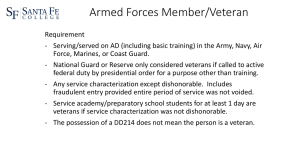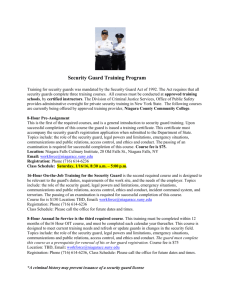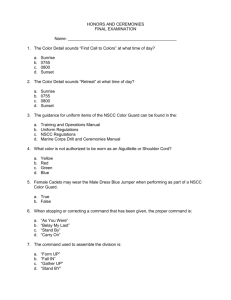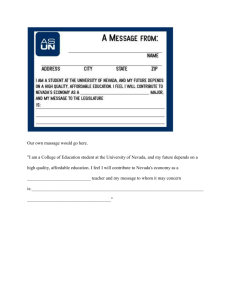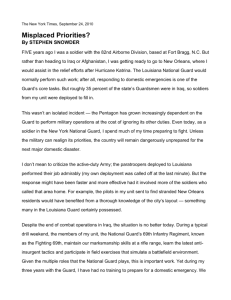Word - Reserve Officers Association of the United States
advertisement
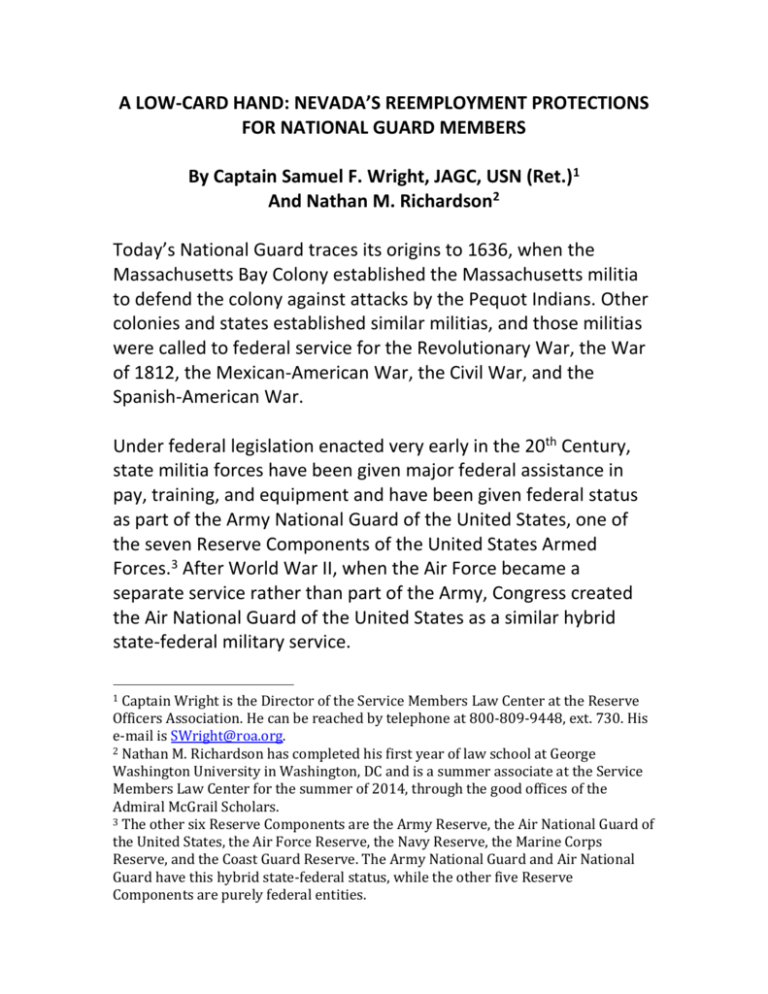
A LOW-CARD HAND: NEVADA’S REEMPLOYMENT PROTECTIONS FOR NATIONAL GUARD MEMBERS By Captain Samuel F. Wright, JAGC, USN (Ret.)1 And Nathan M. Richardson2 Today’s National Guard traces its origins to 1636, when the Massachusetts Bay Colony established the Massachusetts militia to defend the colony against attacks by the Pequot Indians. Other colonies and states established similar militias, and those militias were called to federal service for the Revolutionary War, the War of 1812, the Mexican-American War, the Civil War, and the Spanish-American War. Under federal legislation enacted very early in the 20th Century, state militia forces have been given major federal assistance in pay, training, and equipment and have been given federal status as part of the Army National Guard of the United States, one of the seven Reserve Components of the United States Armed Forces.3 After World War II, when the Air Force became a separate service rather than part of the Army, Congress created the Air National Guard of the United States as a similar hybrid state-federal military service. Captain Wright is the Director of the Service Members Law Center at the Reserve Officers Association. He can be reached by telephone at 800-809-9448, ext. 730. His e-mail is SWright@roa.org. 2 Nathan M. Richardson has completed his first year of law school at George Washington University in Washington, DC and is a summer associate at the Service Members Law Center for the summer of 2014, through the good offices of the Admiral McGrail Scholars. 3 The other six Reserve Components are the Army Reserve, the Air National Guard of the United States, the Air Force Reserve, the Navy Reserve, the Marine Corps Reserve, and the Coast Guard Reserve. The Army National Guard and Air National Guard have this hybrid state-federal status, while the other five Reserve Components are purely federal entities. 1 Members of the Army National Guard and Air National Guard, of whatever state, are protected in their civilian jobs by a federal law called the Uniformed Services Employment and Reemployment Rights Act (USERRA)4, when they are away from those jobs for voluntary or involuntary federal active duty and for inactive duty training (drills), active duty for training (annual training), initial active duty training (boot camp for a person joining the National Guard with no prior military experience), or “full-time National Guard duty” under title 10 or title 32 of the United States Code. Members of the Army or Air National Guard have a hybrid federalstate status. In the state status, they are subject to call by the Governor for state emergencies such as tornadoes, floods, fires, riots, etc. USERRA does not protect the civilian jobs of National Guard members when they are away from their civilian jobs for this sort of state active duty. It is incumbent upon the states to protect the civilian jobs of National Guard members in this situation. We hope that the states will protect all National Guard members who work in the state, including National Guard members of neighboring states who happen to work in the particular state. Nevada’s legislature has codified several protections for members of the National Guard. Nevada Revised Statutes section 412.606 makes it a misdemeanor to discriminate against members of the National Guard in general. Section 412.139 makes it unlawful to terminate a member of the National Guard for service-related reasons: USERRA is codified in title 38, United States Code, sections 4301-4335 (38 U.S.C. 4301-4335). 4 1. An employer may not terminate the employment of a member of the Nevada [emphasis supplied] National Guard because the member: (a) Assembles for training, participates in field training or active duty or otherwise meets as required pursuant to NRS 412.1185; or (b) Is ordered to active service or duty pursuant to 412.1226 or 412.1247. 2. Any employer who violates subsection 1 is guilty of a misdemeanor. 3. In addition to any other remedy or penalty, the Labor Commissioner may impose against the employer an administrative penalty of not more than $5,000 for each such violation. Section 412.1395 deals with reinstatement of illegally terminated National Guard members: If the employment of a member of the Nevada [emphasis supplied] National Guard is found to have been terminated as a result of the member: 1. Assembling for training, participating in field training or active duty or otherwise meeting as required pursuant to NRS 412.118; or 2. Being ordered to active service or duty pursuant to NRS 412.122 or 412.124, the member is entitled to be immediately reinstated to his or her position without loss of seniority or benefits, and to receive all wages and benefits lost as a result of the termination. 5 This section of the Nevada Revised statutes covers “field training periods and active duty for training periods, maneuvers, schools, conferences or other similar duties.” 6 State active duty as ordered by the governor. 7 Federal active duty as ordered by the adjutant general. PROTECTION LOOPHOLES The language used in both of the above statutes creates a gap in protection that affects persons who work in Nevada (regardless of where they live) who serve in the National Guard of neighboring states. The statutes provide no protections to a person who maintains a career in Nevada but is a member of a National Guard based in another state. For example, Mike Griswold is a crime reporter for the Las Vegas Review-Journal. He is also a psychological operations officer in the California Army National Guard. After the Los Angeles Dodgers lose the National League West division championship to the San Francisco Giants, a terrible series of riots springs up in California. California Governor Jerry Brown calls Griswold’s unit to state active duty for 60 days to put down the disturbances. When Griswold returns from California, he has no statutory basis to compel his newspaper to re-employ him. The statute simply does not address anyone in his particular circumstances and applies only to members of the Nevada National Guard. OUTPERFORMANCE BY USERRA When a member of the National Guard seeks reemployment within 5 years of being called to federal active duty, USERRA requires the employer to reinstate the former employee in the position that he or she would have held as if he or she had never left. Nevada’s state statute, on the other hand, only forbids an employer from terminating an employee for service-related reasons. For example, Howie Cannon is chief of security at a world-famous casino on the Las Vegas strip. He is also an artillery officer in the Nevada National Guard. The Governor of Nevada activates Cannon’s unit for 60 days to round up and relocate an endangered species of desert tortoise. Cannon’s employer, the casino’s umbrella corporation, offers a fixed annual promotion for its employees, and when he was activated Howie had just thirty days remaining until he earned his next promotion. When Cannon returns from his mission, his casino reinstates him in the same position he had before he left, without the promotion he would have earned. Unfortunately for Howie, USERRA does not apply to active state service. He has no cause of action against his employer. The story would change if Howie’s unit had been activated by the Federal Government. If, instead of the example above, the Federal Government deployed Howie’s unit to Afghanistan to rescue an endangered species of mountain tortoise, he would be entitled to reinstatement with the promotion he would have earned if he had never left. Incidentally, he also would be able to sue his employer for failing to reinstate him as required by law. WEAK ENFORCEMENT MECHANISMS Nevada has not enacted a strong provision enabling members of the National Guard to sue employers who have violated their rights to reemployment. Rather, section 412.1393 provides, in relevant part, that “any member of the Nevada National Guard who believes his or her employment was terminated in violation of NRS 412.139 may, within 60 days after receiving a notice of termination, request a hearing before the Labor Commissioner to determine if his or her employment was so terminated.” Section 412.139 also sets a maximum penalty for violating employers at $5,000. Overall, these remedies do not provide members of the Nevada National Guard with strong protections against employers, because they do not offer strong disincentives those employers who might consider violating the state law. If Nevada decided to adopt enforcement provisions similar to those found in USERRA and other states, permitting remedies in damages and equity against employers who violate re-employment protections, Nevada would provide its employees who are National Guard members with a much-needed ace in the hole.
